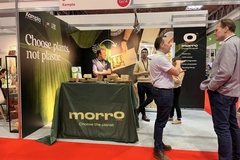
16 Sep 2022 --- Aluminum beverage packaging has seen an upward trend this year and is a main theme at this year’s Drinktec trade show in Munich, Germany. At the show, Trivium showcased its aluminum beverage bottles for various beverage categories.
PackagingInsights speaks to Alison Burns, strategy and business development manager for global beverage at Trivium, about the company’s beverage bottles. She tells us about their environmental sustainability and the necessity of consumer education on the circular economy.
“Our bottles are impact-extruded aluminum, completely made from aluminum and recyclable. We have incredible print capability on these bottles, so we can print in 360 degrees around the bottle with imagery and graphics on the bottle.”

“We work with partners to fill and cap the bottles. The caps are also made out of aluminum. So this is a completely recyclable, super sustainable package,” adds Burns.
“It can easily be recycled through existing infrastructure that exists globally today, and it has high value as a recycled material, so we have really seen a lot of traction with these in the beverage space.”
Trivium can print in 360 degrees around the bottle with imagery and graphics on the bottle.Circular economy
Aluminum is considered a permanent material, meaning that the first time it’s made it can be recycled infinitely, without losing quality, asserts Burns.
“The bottle can be recycled after the consumer drinks from it. It can be recycled, and then it could come back as a beverage container again, multiple times – versus what we see with other substrates, such as plastic and glass, where there is some degradation or contamination in the recycling process.”
“So typically, they [plastic or glass bottles] cannot come back easily as the same beverage package – whereas aluminum can,” she highlights.
Customer transitioning
Burns explains the main challenge for transitioning customers toward aluminum is around changing from different substrates.
“For instance, if you change from plastic or glass, you have to redo some of your artwork and do bottle testing. We work with our technical teams to test the compatibility of every single beverage that gets placed in this bottle,” explains Burns.
“We test for shelf life, and our customers also test for sensory experience to make sure that over time the beverages’ flavor is not going to change as it is in the bottle. So we have an established process that we guide our customers through to make sure that the transition from other substrates is as seamless as possible.”
Burns says that Trivium has not been particularly influenced by supply chain disruptions due to its good procurement and supply chain teams. “We haven’t seen quite the upstream impact that other businesses have. Our teams have been able to minimize disruptions as much as possible.”Alison Burns, strategy and business development manager for global beverage at Trivium.
“Where we have seen some challenges is in hiring. We are growing very rapidly and we are always looking for new people to come and work with us.”
Recycling education
The company has aggressive goals in terms of environmental sustainability, and works with third parties who can certify that for Trivium too, such as EcoVadis and CDP, says Burns.
“The main thing that we like to do is around education. So we work with our customers and help to educate them on the benefits of the aluminum bottle and the benefits of aluminum as a substrate.”
“And we also do what we can to get in front of consumers too, to help to educate the every-day consumer who is going to pick this bottle off the shelf. We educate them on the fact that the aluminum bottles can be recycled through a normal recycling stream and that it could come back as another beverage container in the future,” she concludes.
By Natalie Schwertheim












